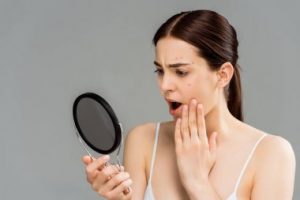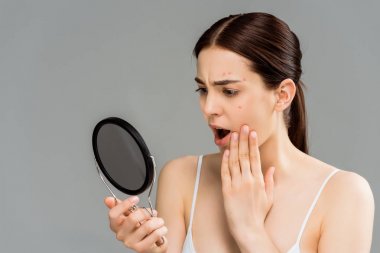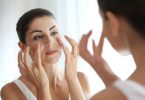Now that you’re older, you’ll no longer be pestered with teenage acne, right? Wrong! If you are in your 30s, 40s, or 50s, and you see random breakouts, you realize that it’s not over yet. Acne can occur at any age. However, the good news is that there are ways to get rid of adult acne. So, how can we get rid of them for good? Read on to find out.
Why do our skin breakouts?
A clogged pore is responsible for acne. The pores are the openings that surround each hair follicle. These pores harbor sebaceous glands, which secrete sebum (oil) through the pore opening to keep your skin protected and soft. But when these pores get clogged by excess oil, dead skin cells, dirt, and bacteria, you’ve got a perfect recipe for acne.
Usually, regular cleansing and exfoliating of your skin can be enough to prevent acne. But when you are an adult, the situation can be a bit complicated. There are various reasons for adult acne, and trying to figure out the cause can be pretty frustrating. So, let’s get down to the causes of adult acne and how to get rid of them.
6 Possible Causes of Adult Acne

Most of the time, adult acne is due to the following factors:
1. Hormones
Your hormones have an influence on your entire body, including your skin. That’s the reason why most women have acne during their period, pregnancy, and menopause. Certain health conditions, such as polycystic ovarian syndrome, cause fluctuation in the hormones, leading to excess androgens (testosterone) production. These hormones boost oil production, which clogs the pores, making it a conducive environment for acne bacteria to flourish. The acne due to hormones usually develops on the lower part of your face, along with the mouth, chin, and jawline.
How to get rid of hormonal acne: If you feel you’ve hormonal acne, over-the-counter topical medication won’t work. Talk to your dermatologist about prescription medication that can block androgen receptors or regulate hormonal fluctuations during your menstrual cycle.
2. Stress
We’ve all been there – a difficult week at work or a little turmoil in your relationship that easily leads to stress. And the next thing you see is acne, making things even worse. Studies have shown that stress increases hormones that boost the production of oil, blocking the pores and causing acne.
How to get rid of stress-related acne: Take a chill pill! Find a way to reduce stress – exercise, meditate, do yoga, or read a book – do whatever helps you manage your stress and keep your skin clear.
3. Pollution
If you live in a city, the dirt and UV radiation can affect your skin badly. Having dirt and grime on your face can increase the chances of pores getting clogged.
We know that UV exposure increases your risk for skin cancer and promotes premature aging, but do you know UV exposure can also cause acne? However, there is no strong evidence suggesting the connection, but sun exposure can possibly cause acne because it dries out the skin. This leads to the production of excess oil to compensate for the lost moisture.
How to get rid of environment-triggered acne: Follow a consistent cleansing routine. When going out or even at home, wear a broad-spectrum sunscreen with at least 30 SPF basically every day.
4. Diet
We know that P. acnes bacteria causes pimples and increases the inflammation in the skin. But do you know that the foods you eat also have the potential to increase oil production, clog pores and make the inflammation even worse?
Studies suggest that eating foods high on the glycemic index (GI) —rich in refined carbs—may harm your skin. These foods increase your insulin levels, and that triggers oil production and excess inflammation, leading to acne.
Milk is also known to cause acne. However, it’s unclear whether it is the high sugar in the milk or the hormones in the milk that is passed on from the lactating cows that causes inflammation of the skin.
How to clear up diet-induced acne: If you notice that your skin gets inflamed after consuming carbs, such as fries, bread, potatoes, donuts, sugary drinks, etc., reduce its intake to see if there’s an improvement. Monitor how certain foods flare your skin and cut them out. If milk is causing your skin to breakout, consider substituting it with almond milk, soya milk or fermented dairy products like yogurt and cheese. You can work with the doctor or dietician to identify triggers and eliminate them from your diet.
5. Skin Products
Some skin products might contain ingredients that are sensitive to your skin, while some may not be friendly to acne-prone skin. If you are not careful in choosing the right skin products, you may cause more harm than good.
How to get rid of skin products-triggered acne: Make sure you use skin products that are non-acnegenic and non-comedogenic. Avoid oil-based products or ingredients that can clog pores. Ensure that you check the labels before buying, especially your sunscreen, cleanser, and moisturizer.
6. Family History
Your genes could be the main cause of your adult acne. If others in your family are suffering from acne, you are genetically predisposed to the condition.
How to manage hereditary acne: When genetics is to be blamed, you cannot do much. However, you can figure out a way to manage it properly. Avoid all the things that can trigger acne. For example, select skin products carefully and eat a healthy balanced diet.
Almost all cases of adult acne can be treated. So get a proper evaluation done of your condition and commit to the treatment regime. Adulthood is stressful enough; we don’t want adult acne adding to your woes.
Author’s Bio:
Krishma Patel is the co-founder and the Superintendent Pharmacist at MedsNow, an online pharmacy in the UK that provides health and wellness products and treatments along with free online consultations. She is passionate about showcasing the integral function community pharmacies can play in supporting the healthcare system and the NHS by providing patients with high quality, safe and discreet access to healthcare at their convenience. Along with being the co-founder of MedsNow, Krishma is also the Director and the Superintendent Pharmacist of Enimed Ltd., an independent pharmacy group comprising 32 branches.








